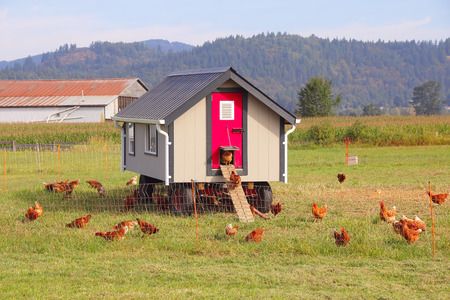
Before a box full of peepers arrives, it is imperative to have a plan for a chicken coop. Chicks that have recently graduated from the brooder should have a coop to call home, and not be left homeless. Ideally, the coop will be prepared and ready for move-in long before the babies arrive.
Chickens, while easy to care for, need the right kind of set-up to be happy, healthy and productive. Here are 8 essential things to know about chickens before planning to build a do it yourself chicken coop.
1. Chickens Need Space
To determine the size and shape of a chicken coop, it is important to consider how many chickens will be housed, as well as the size of the breed. A general rule of thumb is to have 4 square feet per medium-sized chicken. If the coop is too small, chickens will become crowded and peck at each other.
2. Chickens Sleep off the Ground
Unlike ducks, chickens roost as far off the ground as they can get. In the wild, this is their natural instinct which protects them from ground predators. Each chicken prefers to have approximately 8 inches of roosting space for themselves, though they do tend to cuddle up with each other at night. If no roost is provided, they will take to perching on feeders and founts, which can create a dirty environment due to their droppings. With that being said, placing the roost in an easy to clean space is vital to being able to keep the coop clean because they will pile up fast under the roost.
3. Chickens Love the Sun
Chickens will need to have access to natural lighting every day. If they are cooped up in a dark space, their egg production will slow way down, not to mention they will go completely crazy. Building a coop with openings to allow the sun to shine through will keep them laying regularly all year long.
4. Chickens Like to Run
Or they love chicken runs!
Chickens are busy little critters and aside from a safe coop to nest in, they also need a space to stretch their legs. If a flock is not able to free-range, building a run is extremely important so they can forage and stay healthy.
5. Nesting Is Their Thing
For hens to feel like laying eggs regularly, they need to have adequate nesting boxes. If boxes aren’t provided, or they aren’t to their liking, they will take to laying their eggs all over the coop. This makes for dirty, cracked, eggs.
A nesting box should be like a cozy little den for hens to snuggle up in. It should be protected from the environment and should make a hen feel as though she is hiding— and safe from predators.
6. Everything Is Scary for A Chicken
Chickens tend to be nervous nellies, and for good reason: everyone likes the way they taste. So, chickens need to be protected in their coop.
Predators can come in all shapes and sizes, and if there is a way into the coop, they will find it. Flooring should be sturdy, gaps in construction should be minimal, doors should lock. All of these things will lessen the chance of losing precious birds, and breakfast eggs, to nasty predators.
7. Chickens Love Fresh Air
Chickens need ventilation in their coops, even during the winter. During the coop-planning process, it is crucial to consider this fact. If chickens do not have proper ventilation, it can get humid, musty and cause respiratory issues.
Because predators can sneak into the smallest openings, ensuring proper ventilation can be a tricky part of the building process. Leaving too much space may encourage predators, and it may not protect the chickens from the more extreme elements. Chicken wire is perfect for covering any ventilation gaps that might be large enough for a snake or weasel to enter.
8. Chickens Have Built-In Winter Pjs
Contrary to what some people may think, many breeds of chickens are built to withstand frigid temperatures. The jury is still out as to whether heating should be provided for chickens during winter, however, messing with their internal temperature too much will inevitably cause them to become chilled and eventually sick. Unless the temperatures are sub-zero with insane windchills, chickens can handle the temps without added heating. Plus, heat lamps can be fire hazards.
Chickens certainly have their own preferences that should be taken into consideration before building a coop. While they are usually quite hardy, they need proper protection and shelter, as well as the right environment to maintain health and wellness. Find even more information on building chicken coops at The Happy Chicken Coop.


